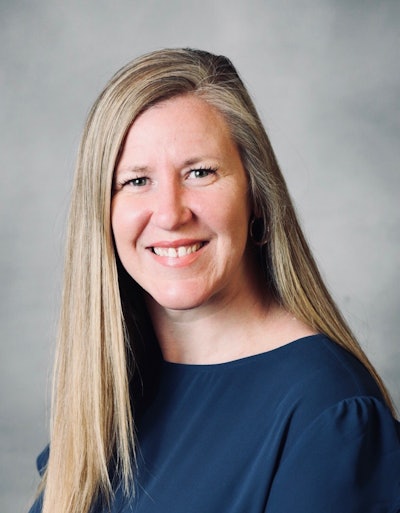Nevitt Sanford’s theory of college student development teaches us that when students are given the right balance of challenge and support, growth is possible. As higher education professionals, we strive to consider all aspects of a students’ development-- cognitive, emotional, psychological, and academic. We are asked, in part because of Nevitt Sanford, to intentionally challenge and holistically support students. But does Sanford's theory of student development take into account the considerable challenge that many of our students encounter just by showing up? Do we, especially at Predominately White Institutions (PWIs), truly understand the challenges presented by our educational places and spaces? Historically Black Colleges and Universities offer some students, often Black students, the opportunity to minimize the ambient challenges they carry with them onto campus and experience college without that additional, and rarely addressed, weight. Sarah Stowens
Sarah Stowens
To be clear, the broader need for HBCUs is not the focus of this article. I am focused on the critical importance of HBCUs for student development specifically and what PWIs and other institutions can learn from their structures of support and commitment to student empowerment. The need for HBCUs was established in 1837 with Cheney University’s founding along with the land grant institutions that were founded with the Morrill Act of 1862. While the need for HBCUs continues to be discussed, in my mind, the discussion is settled. HBCUs are necessary.
College presents a multitude of challenges for students on campuses all around the country every August. Yes, of course, college is full of exciting opportunities, but students are also met with all manner of different pressures and expectations they might not have experienced before. There is a bevy of professionals on campus who stand ready to support students through all of their experiences— faculty, staff, administrators and even other students are available to provide support in and outside of the classroom through the stress that college can provoke. And we know that stress runs rampant on our campuses. In fact, a 2019 study reported that 87% of college students felt overwhelmed by their responsibilities in school. It would seem from this statistic that our students feel the challenge acutely.
Students of color on predominately white campuses need support differently that 87% statistics might imply. The ambient challenges some students of color may face include issues that our white students do not— issues like the lack of representation among faculty, staff and administration, being tokenized during conversations, feeling a need to explain cultural expressions, the aggregate stress of institutionalized and structural racism, and constant microaggressions, performative statements and/or outward racism.
Students of color need additional protective support mechanisms to combat the additional strain that they can feel on a predominately white campus. Maybe we need to rethink what challenge and support looks like as we strive towards growth. While 87% of all college students feel overwhelmed by responsibilities, a recent study found that students of color felt less prepared, out of control, angry or overwhelmed than do white students. Those feelings of stress and frustration can grow from many places, but Black children have a higher likelihood of experiencing adverse childhood experiences (ACEs) because of structural and institutionalized racism which, as they grow up can certainly have an impact on how our students arrive on campus. If we are not specifically considering the lives of our students before they come to our campuses as we design policies and procedures, we may inadvertently exacerbate the inequities that pose challenges for students of color already.
HBCUs can offer students emotional, psychological, and academic support that PWI’s can’t or don’t. Students who choose HBCUs will find a culturally and racially diverse student and faculty population leading to a more supportive and empowering environment, a deeper commitment to academic retention, and a strong emphasis on faculty and student relationships over faculty research. They also boast significant responsibility for achievements in education equity- over 80% of medical doctors and dentists; 75% of Black people who have doctoral degrees; and 50% of Black faculty members at PWIs are all graduates of HBCUs.
HBCUs are not the answer for all students of color and many face their own set of challenges— rising costs, questions about academic quality, infrastructure, student completion, and state and federal policy all present real and immediate challenges for these historic institutions. However, the pandemic has seen rising enrollment numbers, recent federal financial investments in HBCUs including tuition subsidies for needy students, and proposals for additional future investment. So perhaps the tide is turning?
HBCUs can be and often are a solution for some students who want to avoid some of the ambient stressors that can come with enrolling in a PWI. And also, it is clear that HBCUs aren’t the answer for every student. To ensure that students have the support they need and deserve, it is also clear that PWIs can and must identify solutions to their challenges that aren’t just performative. PWIs must take action and make meaningful changes instead of just saying they acknowledge the problems. Statements, for example, following the Black Lives Matter protests in June 2020 said many of the right things, but structural change must follow, or the words are hollow.
Ultimately, our goal should be to ensure students have opportunities to feel safe, respected, and supported as they face the challenges college presents. We know that not all students require the same support, but we also need to acknowledge that the challenges students face can both start on campus or come to campus with our students and may start long before freshman year. How we address the challenges that our students come to campus with will require thought, action, and HBCUs.
Sarah Stowens is an adjunct instructor of sociology and education at Wilmington University.















